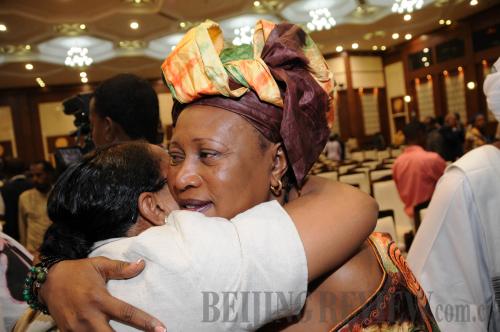|
 |
|
CELEBRATION: Two Sudanese women hug after the results of a south Sudan referendum were announced in Khartoum on February 7. Nearly 99 percent of voters chose to secede from the north (XINHUA) |

The final results of a south Sudan referendum, announced by the South Sudan Referendum Commission in Khartoum on February 7, showed that 98.83 percent of voters chose to secede from the north. Shortly before the announcement, Sudanese President Omar al-Bashir issued a decree saying he would accept the final results. It seems clear, then, south Sudan will secede from the north and become an independent country. But can north Sudan and south Sudan truly embrace stability, prosperity and democracy after separation?
Western interference
Before Sudan's independence in 1956, British colonists controlled the country with a "divide-and-rule" policy that widened the gap between the north and the south. After its independence, Western countries, including the United States, did not like the Sudanese regime and gave long-term support to south Sudan's separatist activities.
This interference was an important external factor in Sudan's long-lasting civil wars and led to tensions between Sudan and Western nations. In 1993, the United States added Sudan to the "state sponsors of terrorism" list and, in 1996, it pressed the UN Security Council to pass a resolution imposing diplomatic and aviation sanctions against Sudan. In 1997, it unilaterally imposed economic sanctions against Sudan. In the following year, U.S. missiles damaged the Al-Shifa pharmaceutical plant near Khartoum; the United States believed the plant was manufacturing chemical weapons.
After the September 11, 2001 terrorist attacks, tensions between the United States and Sudan eased slightly. That year, the UN Security Council lifted sanctions against Sudan. But the United States did not remove Sudan from the "state sponsors of terrorism" list and it kept the economic sanctions in place.
Western countries, led by the United States, also exerted pressure on the Sudanese Government by making conflict in Sudan's Darfur region an international concern. In 2009, the International Criminal Court in the Hague issued an arrest warrant for Omar al-Bashir for war crimes and crimes against humanity in Darfur. It was the first arrest warrant ever issued for a sitting head of state by the world's only permanent war crime tribunal. The African Union and the League of Arab States condemned the move for undermining political reconciliation in Sudan.
In addition, many parties and political organizations in south Sudan enjoy Western countries' support. For instance, the Sudan People's Liberation Movement and the autonomous government of south Sudan have established offices in the United States and Belgium.
After taking office in 2009, U.S. President Barack Obama adjusted the United States' hard-line policy toward Sudan, adopting a policy of engagement. And he expressed willingness to maintain dialogue with Sudan.
The United States promised to remove Sudan from the "state sponsors of terrorism" list once south Sudan gained independence. After referendum results were announced on February 7, Obama said the United States would recognize south Sudan as an independent sovereign state after a six-month transition period.
Separation backlash
South Sudan's secession will not only change Sudan's political landscape, but may damage already shaky African stability. It may also exacerbate existing problems, such as ethnic groups with cross-border ties and tribal conflicts.
The negative impact of separatism will continue to influence Sudan's development as a nation-state. South Sudan's separation may spur further tribal conflicts in Darfur and in Sudan's oil-rich Abyei region. The Sudanese Government must face this challenge seriously. It must determine how to eliminate separatist influences and properly solve religious and tribal disputes to strengthen the Sudanese national identity and consolidate a nation-state that has stood for more than half a century.
Due to complex historical and social reasons, Sudan has experienced more than five decades of turmoil since gaining independence. It suffered two civil wars from 1955 to 1972 and from 1983 to 2005, totaling 40 years, longer than any other country on the African continent. As a result, its social and economic development has been severely hindered.
The UN has long designated Sudan as one of the "least developed countries." While the world has entered the information age, Sudan does not have a significant industrial base. Only the oil industry, established in the late 20th century, is relatively modern.
| 